




 |
   |
 |
|
Nikolaj & Piloterne Nil Nilsson Nine Days Wonder |
Nine Inch Nails Nirvana Nits Noémi |
Akiva Nof Rasmus Nøhr I Nomadi |
Nonames Carol Noonan Band Emma Nordenstam |
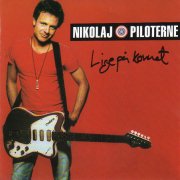 |
Lige på Kornet (2002, 40.03) **½/T |
|
| Åbn Din Dør Kun Os To Kaptajnen Det Gode Selskab Super I Må Ku' Se Baby Du Fader Vil Du Vente på Mig |
Selvom Alting Går Ned Titanic |
|
Current availability:
Mellotron used:
Nikolaj Christensens formed Nikolaj & Piloterne (Nikolaj & the Pilots) in the early '90s, after a brief teenybop period, Lige på Kornet being something like his seventh release. And it sounds like...? Faceless, Danish-language adult pop/rock, frankly, at its least dull on Kun Os To and Super.
Producer Frank Birch Pontoppidan plays real-sounding Mellotron, with strings on opener Åbn Din Dør and Super, nicely upfront on the latter. The album was partially recorded at Abba's Polar facility in Stockholm, but I was under the impression that their Mellotron was out of commission at that time (if not now), so hard to say where they sourced a working machine.
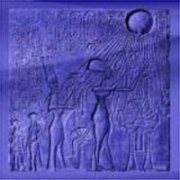 |
Quarante Jours Sur Le Sinaï (2003, 65.03) ****/TAct IAct II |
Current availability:
Mellotron used:
 |
Nil are a current French progressive outfit whose mix'n'match approach to the genre is refreshingly postmodern, as they combine elements of '70s symphonic prog, '80s metal, jazz and more recent influences into a mélange of progressiveness, creating something new in the process. Their third album, Quarante Jours Sur Le Sinaï (Forty Days on the Sinaï), seems to be rated the most highly by online reviewers; it's a concept work involving Atlantis and ancient Egypt, consisting of two lengthy acts, each broken up into numerous shorter pieces. A great deal of the album is instrumental, although there are vocal passages, including a spoken-word piece by (presumably) Audrey Casella, entirely unintelligible to non-French speakers.
Although many acoustic instruments are credited, including soprano sax, cello, bass clarinet and harp, the overriding sound of the album is that of a regular rock band, with a great deal of guitar and modern synth work, although the latter never shifts into 'cheese' territory; keys man Benjamin Croizy appears to know what he's doing and never overuses the 'typical' digital sounds. Although it's credited, there's actually very little Mellotron (picture of a battered face-plate in the booklet, right) on the album; all I can hear in the first movement is a brief choir part towards the end, although there's a major strings and choir section about halfway through Act II, before the more 'standard' 'boards kick in again.
See: Samples etc.
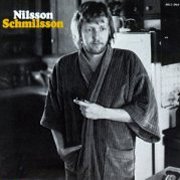 |
Nilsson Schmilsson (1971, 35.21) ***/T |
|
| Gotta Get Up Driving Along Early in the Morning The Moonbeam Song Down Without You Coconut Let the Good Times Roll |
Jump Into the Fire I'll Never Leave You |
|
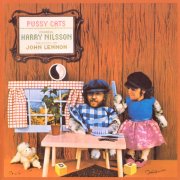 |
Pussy Cats (1974, 37.02) **½/T |
|
| Many Rivers to Cross Subterranean Homesick Blues Don't Forget Me All My Life Old Forgotten Soldier Save the Last Dance for Me Mucho Mungo/Mt. Elga Loop De Loop |
Black Sails Rock Around the Clock |
|
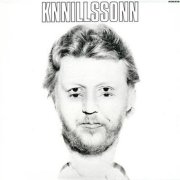 |
Knnillssonn (1977, 37.04) **½/T½ |
|
| All I Think About is You I Never Thought I'd Get This Lonely Who Done it? Lean on Me Goin' Down Old Bones Sweet Surrender Blanket for a Sail |
Laughin' Man Perfect Day |
|
Current availability:
Mellotrons used:
What irony; fêted throughout his career as a 'classic' songwriter, Harry Nilsson remains best-known for his overwrought version of Badfinger's cheese classic Without You, although we can't hold him responsible for the appalling Mariah Carey's abominable version, I suppose. After watching his Hollywood drinking buddies die around him, Nilsson, career in freefall, hung on until 1994, before finally drinking himself to death.
Nilsson Schmilsson is a somewhat mixed bag, despite (or because of?) containing the aforementioned Without You; few of the songs strike me as being 'classic', while the supposed 'hard rock' of Jump Into The Fire, well, er, isn't really. Very tame, although I'm sure I'm heavily missing the point (The Point! Geddit? Oh, never mind...). Maybe the album made more sense at the time; listening to it thirty years later, it's impossible not to compare it with everything that's happened since. Mellotron on two tracks; Driving Along has strings and maybe brass, played by both Harry and Richard Perry, while Nilsson tackles the flutes on The Moonbeam Song alone. Hardly classic use, to be honest, although it's always nice to hear a reasonable Mellotron part. The Moonbeam Song also turns up on 1974's Son of Dracula (soundtrack to the film of the same name), although I believe it's the same recording as on Schmilsson. Pussy Cats from the same year has one Mellotron track, too, with exceedingly smooth strings on Black Sails (a.k.a. Black Sails In The Moonlight), one of the album's least irritating efforts. Produced by the 'lost weekend' John Lennon, the album is decidedly uneven, not helped by Harry's rupturing of a vocal cord during recording, a fact he hid from Lennon (how?). Several dodgy covers do nothing to improve matters, so I think you're probably best off giving this a miss.
Nilsson's penultimate release, 1977's Knnillssonn (you'll know the sleeve, if not the contents) features his last Mellotron use (thanks, Mark). The album is pretty much what you'd expect from a terminal alcoholic, although the amusing talking blues (Nilsson style) Who Done It? caught my attention, while balladic closer Perfect Day (not that one) lends the album a hint of late-in-the-day gravitas. Someone (Nilsson himself?) plays Mellotron on two tracks, with flutes (later morphing into strings) on Old Bones and flutes running right through Blanket For A Sail, for what it's worth. Little-known fact about Harry Nilsson (gleaned from Wikipedia - sorry): both "Mama" Cass Elliott and Keith Moon died in his London flat; no wonder he got rid of the place soon after the latter's demise.
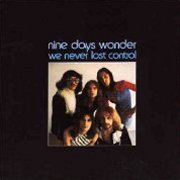 |
We Never Lost Control (1973, 35.35) ***/TTDays in Bright LightFisherman's Dream Andromeda Nomads The Great Game Angels Due to Arrive We Grasp the Naked Meat Armaranda |
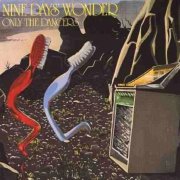 |
Only the Dancers (1974, 38.42) **½/TTLong Distance LineOnly the Dancers It's Not My Fault Frustration Hovercraft Queen Time is Due The Way I'm Living Moment |
Current availability:
Mellotrons used:
Nine Days Wonder formed in the mid-'60s, but didn't release anything until 1971's Nine Days Wonder; that version of the band broke up, leaving vocalist Walter Seyffer to join Medusa, who became the second version of Nine Days Wonder (their countrymen The Scorpions pulled a similar stunt a couple of years later). Their second album, with the almost entirely new lineup, was We Never Lost Control, falling into the same general area as Message, rather middling prog-ish German rock, without any major distinguishing features. It's not a bad album, but not something to which I expect to return that often. Freddie Münster plays Mellotron on three tracks, with full-on cellos and strings on Fisherman's Dream, a brief flute line at the beginning of the oddly-titled We Grasp The Naked Meat, a string part later on in the nine-minute track and some very background strings in closer Armaranda.
They followed up with 1974's Only the Dancers, which is, by and large, more mainstream than its predecessor, more in line with Message's later albums. The nearest the album gets to a highlight is closer Moment, which is the only progressive track here, if you use the term loosely. Mellotron strings from guest Steve Robinson (from Twenty Sixty Six & Then) on It's Not My Fault and The Way I'm Living, although the only part worth writing home about is on Moment, where he actually goes for it properly, though it's a case of too little, too late, I'm afraid.
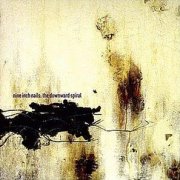 |
The Downward Spiral (1994, 64.57) ***/½ |
|
| Mr. Self Destruct Piggy Heresy March of the Pigs Closer Ruiner The Becoming I Do Not Want This |
Big Man With a Gun A Warm Place Eraser Reptile The Downward Spiral Hurt |
|
Current availability:
Mellotron used:
I've never really understood why so-called 'industrial' music is so popular; I remember when the term was first used to describe bands like Einsturzende Neubauten and SPK, who were using genuine industrial machinery on stage, generally making a fine old racket. NIN and their ilk, to my ears, anyway, sound like a goth/metal crossover with 'industrial' sounding samples; not the same thing at all really, is it? NIN are not so much led by Trent Reznor as 'are essentially his solo project', other musicians taken on board as and when they're needed, but, given that Reznor runs the whole show, his/their work achieves a kind of consistency often missing when a committee (you know, other band members) are involved.
1994's The Downward Spiral is famous for hosting possibly Reznor's best song, Hurt (as covered monstrously well by Johnny Cash), but the bulk of the record is more typical of his style, being, basically, electronic rock: sampled drums and sequenced synths paired with metallic guitars and sinister, up-close vocals, used to surprisingly good effect in places, not least the piledriving I Do Not Want This. Reznor plays skronky Mellotron flutes on the title track.
See: Samples etc.
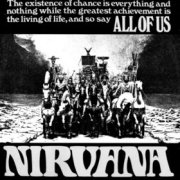 |
All of Us (1968, 35.48) ***½/T |
|
| Rainbow Chaser Tiny Goddess The Touchables (All of Us) Melanie Blue Trapeze The Show Must Go on Girl in the Park Miami Masquerade Frankie the Great |
You Can Try Everybody Loves the Clown St. John's Wood Affair |
|
Current availability:
Mellotron used:
This is the band who took Kurt Cobain's crew to court, eventually settling the matter amicably. Alex Spyropoulos and Patrick Campbell-Lyons started working together in 1967, a few months after Cobain was born, releasing their debut, The Story of Simon Simopath, that autumn, making it possibly the first narrative 'concept' album. Despite being tagged 'psychedelic', the duo were more about well-crafted songwriting than studio trickery, although their 'classic', Rainbow Chaser, used phasing (actually ADT) extensively.
Rainbow Chaser opened their second album, 1968's All of Us; while it's clearly the album's best track, that's not to denigrate the rest of the material. A couple of slightly regrettable moments occur, not least the children's choir on Everybody Loves The Clown and the rhyming of 'Frankie' with 'wanky' in Frankie The Great, but, overall, we're talking songs of the quality of Girl In The Park and St. John's Wood Affair, making this a solid late-'60s effort, while not up with the likes of The Zombies' deathless Odessey & Oracle or Fairfield Parlour's From Home to Home. Very little Mellotron, to be honest (player unknown), as most of the album's strings are real, although the overlapping single string notes on You Can Try are definitely a MkII.
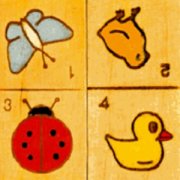 |
dA dA dA (1994, 55.33) **½/TT½ |
|
| dA dA dA Dreams What We Did on Our Holidays Mourir Avant Quinze Ans Homeless Boy Whales of Tadoussac Chameleon Girl Instead of... |
Day & the Night Desert Island Song Sorrow Bilbao Boa Abandoned Mine |
|
Current availability:
Mellotron used:
dA dA dA was The Nits' first international release (the band have been together since the mid-'70s), sung in English, although it didn't make global superstars of the band. Listening to it, it's hardly surprising; it isn't a bad album, but its skewed take on mid-'90s pop was never going to get them that platinum disc. The title track seems to be an offbeat eulogy for someone's father, thus the childlike title, most of the rest of the album being folk-influenced vaguely Celtic pop/rock, just that little bit too far from the mainstream to sell in large quantities, although that was clearly its intention.
Keys man Robert Jan Stips was a lynchpin of revered Dutch progsters Supersister in the early-to-mid-'70s, his association with The Nits beginning when he produced their 1979 effort, Tents, joining the band full-time in 1983. I don't know if he's used any Mellotron on any other Nits albums, but he gets a good bit in here, with very obvious strings on Dreams, a short flute solo part and more strings on What We Did On Our Holidays, strings (over synth ones) on Mourir Avant Quinze Ans and flute stabs on Homeless Boy. It's almost as if they recorded the album, song by song, in its eventual running order and Stips could only make it for a few days, so he only contributed on tracks two to five. Odd.
 |
RossoNoemi (2011, 37.27) **½/TUpFortunatamente Vuoto a Perdere Sospesa Dipendenza Fisica Odio Tutti i Cantanti Poi Inventi il Modo Musa Le Luci dell'Alba |
Current availability:
Mellotron used:
Veronica "Noémi" Scopelliti broke into the mainstream due to her involvement in Italy's 2008 X-Factor, so it's a minor surprise that her second album, 2011's RossoNoemi, injects a level of rock into the expected pop. Opening with the dulcet tones of a grinding Hammond, powerchords and full-blown widdly guitar solos are all over the record, although the material will only disappoint anyone looking for anything out of the ordinary.
Roger Manning Jr. (Jellyfish, many others) plays Mellotron, with background strings on Fortunatamente and flutes on Sospesa, although all other string parts sound real. While the album has its moments, it's basically lightweight pop/rock, so don't go too far out of your way.
 |
7" (1972) **/TT Jezebel |
Current availability:
Mellotron used:
Akiva "Nof" Naparstek (ףונ אביקע; male, in case you were wondering) is an Israeli 'poet and song-writer, composer, politician, lawyer and a journalist' (thanks, Wikipedia), whose 1972 single Jezebel (or Izevel; לבזיג) was a major hit. As with many other Israeli records from the era, it's a folk-influenced pop number, of next to no interest to the outside world, klezmer fans excepted.
An unknown musician plays Mellotron strings across the track; the first Mellotron in Israel? It's certainly the first track I'm aware of, for what that's worth. Anyway, if I find out anything else about this (b-side? Was it on an album?) I shall report back.
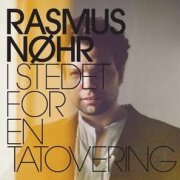 |
I Stedet for en Tatovering (2008, 32.26) **½/½ |
|
| Alderspræsident Tættest På Du Lyser Op Os To Vi Var Fyr den Af Regnvejr Lille Spejl |
Louis' Trompet Slik Forår for Indien |
|
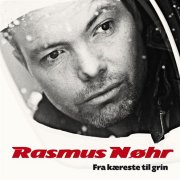 |
Fra Kæreste til Grin (2010, 41.31) ***/T |
|
| Fra Kæreste til Grin Vintertræk Øl på Bryggen Alting Går i Ring På Værtshus Låne Mine Øjne Sød Musik Dragen på Din Ryg |
Dumme Hjerte På Stranden En Lille Ny (Sang) Pigen Med det Røde Telt |
|
Current availability:
Mellotrons used:
Rasmus Nøhr is a Copenhagen-born Danish singer-songwriter who leapt to fame with a duet with Ida Corr, Det Glade Pizzabud, in the early 2000s. His insipid third album, 2008's I Stedet for en Tatovering (instead of a tattoo), is a deeply unexciting Danish-language pop/rock effort, teeth-grindingly dull at first, picking up (albeit slightly) later on, with the likes of the jazzy Louis' Trompet and the rocky(-ish) Slik, easily the best things here. Given that Tim Christensen's involved, it seems likely that Jeppe Tuxen's background Mellotron strings on Lille Spejl are genuine, although I've had this in 'samples' for a while.
2010's Fra Kæreste til Grin is a bit of an improvement, better tracks including På Værtshus, the slow-burn Låne Mine Øjne and En Lille Ny (Sang). Tim plays one of his M400s on the album, with strings (combined with brass? And/or choir?) on Sød Musik and (I'm going out on a limb here) Mellotron guitar (doubled with vibes?) on På Værtshus. I can't prove the latter sighting, but it has that Mellotronic combination of attack and volume fluctuation that I've heard on other lesser-known sounds.
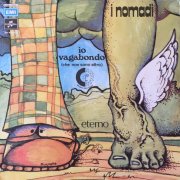 |
7" (1972) ***½/TTT Io Vagabondo (Che Non Sono Altro) Eterno |
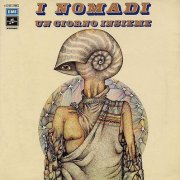 |
Un Giorno Insieme (1973, 33.48) **½/TUn Giorno InsiemeIl Gigante Tornerò Abbi Cura di Te Stagioni Un Po' di Me Domani Icaro |
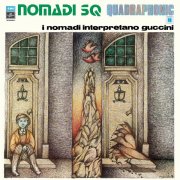 |
I Nomadi Interpretano Guccini (1974, 37.35) ***/0AsiaIl Vecchio e il Bambino Piccola Città Canzone della Bambina Portoghese L'Isola Non Trovata La Collina |
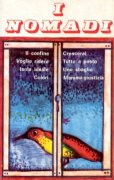 |
Tutto a Posto (1974, 28.59) **½/T½Il ConfineVoglio Ridere Isola Ideale Colori Crescerai Tutto a Posto Uno Sbaglio Mamma Giustizia |
Current availability:
Mellotrons used:
(I) Nomadi formed in 1961 and, at the time of writing, are still a going concern, almost sixty years later. A 1972 single, Io Vagabondo (Che Non Sono Altro) b/w Eterno, is distinctly different from the version on the cassette-only Io Vagabondo, from the same year. The 'A' is an upbeat number, neither here nor there, although the flip is a superb slice of largely instrumental Italian prog, well worth tracking down. However, Io Vagabondo is a total Mellotron-fest, stuffed full of flutes, strings and brass (from regular keys man Beppe Carletti?), although, sadly, the prog mini-epic is Mellotron-free.
By their third album 'proper', 1973's Un Giorno Insieme, they had as many compilations on the market as original releases, betraying their origins as a singles outfit. To be honest, the contents of this album (which includes three covers, including Elton John's Seasons/Stagioni) could quite easily be a series of slushy 7"s, not really at their best on anything. Someone (regular keys man Beppe Carletti?) plays Mellotron strings on Tornerò, quite distinct from the real ones on most tracks. Their follow-up, 1974's I Nomadi Interpretano Guccini (originally only released in quad, it seems), does precisely that, the band interpreting six songs written by Italian legend Francesco Guccini in their own 'orchestral progressive' style. The end result is a prog-lite release, not dissimilar to many other Italian kind-of progressive albums of the era, at its best on opener Asia, although it's all a bit insipid for my tastes. Guitarist Chris Dennis is credited with Mellotron, but, along with the credited synths, I'd love to know where. All string parts appear to be real, as does the vibraphone on closer La Collina. Is it backing up the strings? Almost impossible to say.
To translate Discogs' explanation from the slightly mangled English, Tutto a Posto is '...an album, published exclusively in the format audio cassette and stereo 8 cartridge, all songs were rearranged by Vincenzo Tempera, some are completely new and others appeared only in 7" version'. A quick Google search tells me that three were released as singles, Voglio Ridere and Mamma Giustizia from 1973 and '74's Tutto A Posto, while all eight tracks have become subsequently available on CD compilations, should you be interested. However, unless you're into Big Mediterranean Balladry, I really wouldn't. Any better tracks? Perhaps opener Il Confine. Someone (Carletti again?) plays obvious Mellotron brass (trumpets?) on opener Il Confine and lush strings on Crescerai, but nowhere near enough to make this worth hearing.
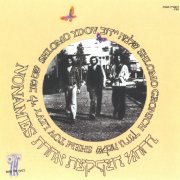 |
Nonames [a.k.a. Ktzat Acheret] (1975, 43.15) ***½/½ |
|
| Travelling Guru The Little Prince Ahemi's Piece Pink Skies Spring Two Chinese Quinta |
The Echo 204 Sweet Song Bissalad |
|
Current availability:
Mellotron used:
Nonames (or No Names, a.k.a. Ktzat Acheret) were one of a handful of Israeli progressive bands in the '70s, along with the better-known Zingale and the recently-discovered Atmosphera; they were apparently something of a 'supergroup', comprising members of other fairly well-known outfits. I believe Nonames was their sole album, a mixture of psych, folk and early progressive elements, jumping from one style to another in a slightly disconcerting, though refreshing way. In fact, I think it's fair to say that every track on the album sounds different to every other, but if you're fine with diversity (and why wouldn't you be?), you stand a good chance of enjoying this.
Very little Mellotron indeed, with strings on the frankly bizarre Bissalad from Shlomo Gronich, but really not enough to be worth bothering with. In fact, where the hell did they get access to a Mellotron in mid-'70s Israel? I know there's a couple in Tel Aviv now, but then? Must've been one somewhere. Anyway, a good, unusual album that covers a lot of ground in forty-odd minutes and which will doubtless repay repeated listens. Worth the effort, though not for the Mellotron.
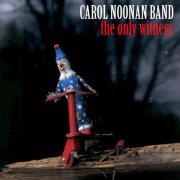 |
The Only Witness [as Carol Noonan Band] (1997, 48.14) ***½/TT |
|
| Don't Be Afraid Emery Lane Steadfast Taillights Fade Queen Jane Not Coming Home Under My Eyes Break Her Heart |
The Only Witness Unknown Thing |
|
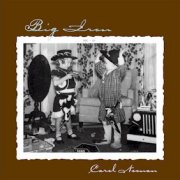 |
Big Iron (2001, 44.34) ***/T |
|
| Red River Valley Streets of Laredo Wayward Wind High Noon Big Iron Lonesome Saddle Down in the Valley Cross to Bear |
Shenandoah Mae Oh Mae Unknown Thing |
|
Current availability:
Chamberlins used:
After singing with New England outfit Knots & Crosses, Carol Noonan released her first solo album in 1995, '97's The Only Witness (credited to The Carol Noonan Band) being her third. Largely balladic, it's a quietly beautiful album, exceptions being Queen Jane's (still excellent) raga-rock and the more upbeat Taillights Fade, Not Coming Home and Break Her Heart. Highlights? Probably Queen Jane and the title track. Paul Bryan plays Chamberlin, Emery Lane opening with a lush Chamby string part and a skronky flute melody, with cellos on Queen Jane, if briefly and cellos and strings on Under My Eyes.
2001's Big Iron (no 'band' credit this time round) veers closer to the country spectrum, at its best on heartfelt opener Red River Valley (source for Johnny & the Hurricanes' stupendous Red River Rock, of course), Streets Of Laredo and the title track. Bryan on Chamby again, with background strings on Wayward Wind and little bursts of solo male voice on the title track, although I suspect the strings on Mae Oh Mae are his credited Orchestron.
See: Paul Bryan
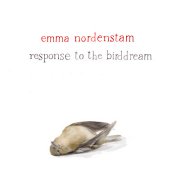 |
Response to the Birddream (2013, 41.38) ***½/T |
|
| Response to the Birddream The Room I'm in Shadow Long Since Gone Headlong You Go Cry Strangers As We Fall |
Will I Find a Road? Why Are They Holding Me Back? Cowboy They Love You The Opening Within |
|
Current availability:
Mellotron used:
Emma Nordenstam combines making music of a quiet, melancholic beauty with writing children's songs. Is there something wrong in hoping that they, too, have a quiet, melancholic beauty? Her third album, 2013's Response to the Birddream, her first fully English-language record, is mostly acoustic, highlights including the brief, opening title track, Headlong, As We Fall and seven-minute closer The Opening Within, the only full band track on the album.
Anekdoten's Nicklas Barker is credited with Mellotron on The Opening Within, recorded by Mattias 'Änglagård' Olsson. I know both of them have used hardware sample players, but the flutes and strings on the track sound like they could be genuine tape-replay. Could be. Hardly the best reason to hear this lovely album, either way.